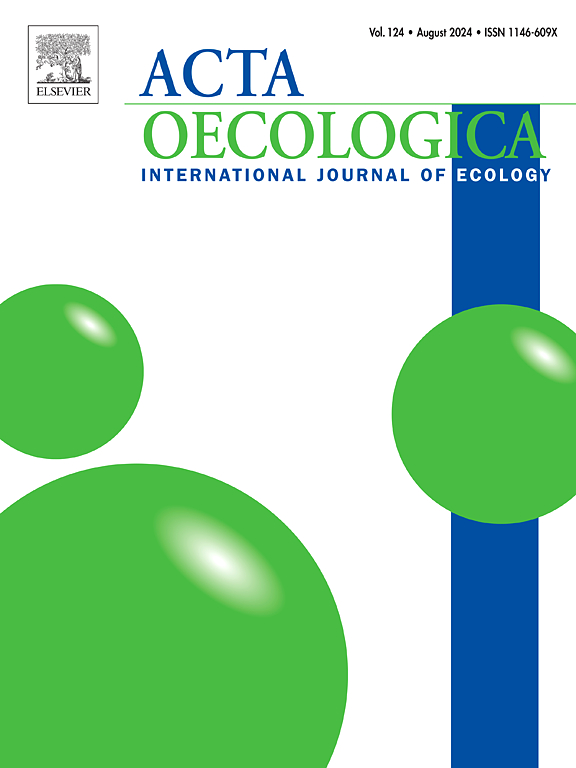Understorey-nesting bird community responses to land use in the Korup National Park, an Afrotropical rainforest in South-Western Cameroon
IF 1.3
4区 环境科学与生态学
Q3 ECOLOGY
Acta Oecologica-International Journal of Ecology
Pub Date : 2024-11-22
DOI:10.1016/j.actao.2024.104040
引用次数: 0
Abstract
Tropical forest biodiversity is under immense pressure due to a combination of global and local factors, including climate change and intensive land use. Birds play an important role in tropical forest ecosystems, contributing significantly to various ecosystem services. This study examined the impact of deforestation on the richness and abundance of understorey-nesting bird communities along a land-use intensification gradient in the peripheral zone of Korup National Park, Southwest Cameroon. We selected 30 sampling plots, each covering 4 ha, across five habitat types: near-primary forest, secondary forest, disturbed forest, cocoa/coffee plantations, and annual food crop fields. A total of 236 understorey bird nests were identified, representing 16 species. Our findings revealed that land use intensity significantly influenced bird species richness and abundance. Primary and secondary forests provided 75% of the nesting species and 71% of the nests. However, 19% of the species either appeared or increased in cocoa/coffee plantations and annual crop fields. Among the feeding groups, frugivores were the most sensitive group to deforestation. This study corroborates the adverse effects of forest destruction on birds communities and highlights the urgent need to address the rapid and extensive forest conversion occurring within Korup National Park. Allowing secondary forests to regenerate and preserving large patches of primary forest are essential strategies to help understorey-nesting bird communities mitigate the impacts of global changes.
喀麦隆西南部非洲热带雨林科鲁普国家公园林下鸟类群落对土地利用的反应
在气候变化和土地密集使用等全球和地方因素的共同作用下,热带森林的生物多样性面临着巨大压力。鸟类在热带森林生态系统中扮演着重要角色,为各种生态系统服务做出了巨大贡献。本研究考察了喀麦隆西南部科鲁普国家公园外围地带森林砍伐对林下鸟类群落丰富度和丰度的影响。我们在近原始森林、次生林、受干扰森林、可可/咖啡种植园和一年生粮食作物田这五种栖息地类型中选择了 30 个采样点,每个采样点占地 4 公顷。共发现 236 个林下鸟巢,代表 16 个物种。我们的研究结果表明,土地利用强度对鸟类物种的丰富度和丰度有很大影响。原始森林和次生林提供了 75% 的筑巢物种和 71% 的鸟巢。然而,19%的物种出现或增加在可可/咖啡种植园和一年生作物田中。在觅食群体中,食俭动物是对森林砍伐最敏感的群体。这项研究证实了森林破坏对鸟类群落的不利影响,并强调了解决科鲁普国家公园内发生的快速、大面积森林转换问题的紧迫性。让次生林再生和保护大片原始森林是帮助林下鸟类群落减轻全球变化影响的基本策略。
本文章由计算机程序翻译,如有差异,请以英文原文为准。
求助全文
约1分钟内获得全文
求助全文
来源期刊
CiteScore
3.60
自引率
0.00%
发文量
57
审稿时长
>0 weeks
期刊介绍:
Acta Oecologica is venue for the publication of original research articles in ecology. We encourage studies in all areas of ecology, including ecosystem ecology, community ecology, population ecology, conservation ecology and evolutionary ecology. There is no bias with respect to taxon, biome or geographic area. Both theoretical and empirical papers are welcome, but combinations are particularly sought. Priority is given to papers based on explicitly stated hypotheses. Acta Oecologica also accepts review papers.

 求助内容:
求助内容: 应助结果提醒方式:
应助结果提醒方式:


